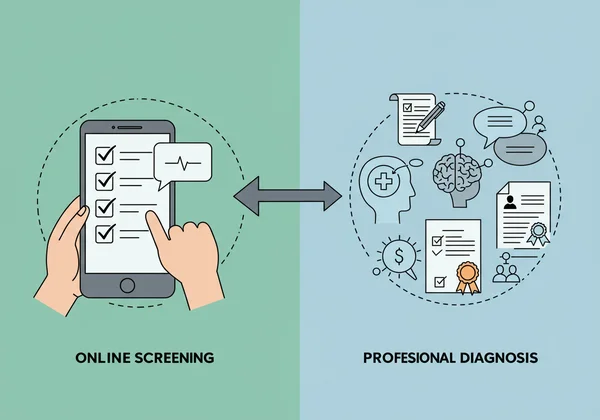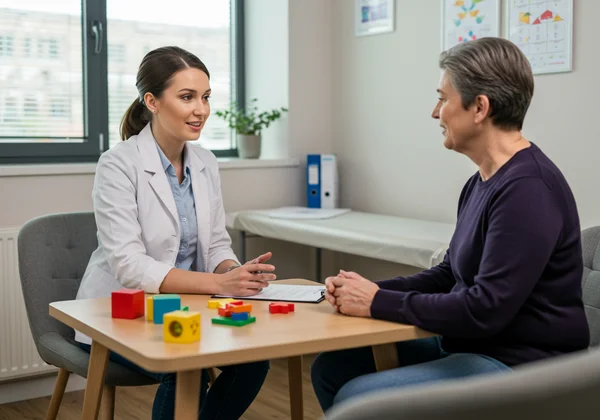Adult Autism Test & Diagnosis: A Complete Guide
August 17, 2025 | By Seraphina Rivers
You've taken an online Autism Test, and the results suggest you might have autistic traits. A wave of questions likely follows, chief among them: What to do after an online autism test? The path to a professional diagnosis can feel overwhelming, but you are not alone. This guide breaks down the entire adult autism assessment process into clear, manageable steps, empowering you to seek clarity with confidence. The journey of self-discovery often begins with a single question, and taking that first step with a tool to get initial insights is a powerful start.

Why a Professional Autism Diagnosis Matters
While an online screener provides valuable self-insight, a formal diagnosis from a qualified professional is a different and crucial step. It serves as a bridge between personal understanding and official recognition, unlocking new avenues for support and self-acceptance. This process is about validating your experiences and empowering your future.
From Self-Insight to Official Validation
For many adults, seeking a diagnosis is about finding a framework for a lifetime of feeling "different." It’s the process of replacing uncertainty with a clear, neurodiversity-affirming explanation. An official diagnosis can validate your lifelong experiences, providing a profound sense of relief and helping you build a stronger, more authentic sense of self. It confirms that your challenges with social communication or sensory sensitivity are real and part of your unique neurotype.
Accessing Workplace Accommodations and Support
A formal diagnosis is often necessary to access legal protections and reasonable accommodations in the workplace or educational settings. This can include things like noise-canceling headphones, flexible work hours, or clearer, written instructions. It is a key that unlocks support systems designed to help you thrive, not just cope. It ensures you have the resources you need to perform at your best.
The Difference Between Screening and Diagnosis
It is vital to understand the distinction between a screening tool and a diagnostic assessment. An online autism test is a preliminary screener, much like a questionnaire you might fill out at a doctor's office. It identifies potential traits and suggests if further evaluation is warranted. In contrast, a professional diagnosis is a comprehensive, multi-faceted evaluation conducted by a qualified clinician, leading to a formal medical conclusion.

How to Get Tested for Autism: Finding a Specialist
Finding the right professional is the most critical step in your diagnostic journey. You need a clinician with specific experience in diagnosing autism in adults, as the presentation can be quite different from that in children. Many adults have developed sophisticated coping mechanisms, or "masking," which requires a skilled evaluator to see beyond.
Identifying the Right Professionals
The most qualified professionals to conduct an adult autism assessment are typically:
- Clinical Psychologists (Ph.D. or Psy.D.): They are trained in psychological testing and diagnosis. Many specialize in neurodevelopmental conditions like Autism Spectrum Disorder (ASD).
- Psychiatrists (M.D.): As medical doctors, they can diagnose autism and also rule out or identify co-occurring medical conditions. They can also manage medication if needed.
When searching, look for providers who explicitly state they have experience with "adult autism assessment" or "neurodiversity-affirming" practices.
Using Professional Association Directories
A great place to start your search is with national and local psychological or psychiatric associations. Their websites often feature "Find a Therapist" or "Find a Psychologist" directories that allow you to filter by specialty, location, and insurance. This ensures you are finding a licensed and credible professional. You can also ask your primary care physician for a referral to a trusted specialist.
Questions to Ask a Potential Provider
Before committing to an assessment, it's wise to have a brief consultation. This is your chance to interview them and ensure they are a good fit. Key questions to ask include:
- What is your experience with diagnosing autism in adults, particularly in my gender or demographic?
- What does your assessment process involve?
- How do you differentiate autism from other conditions like ADHD or social anxiety?
- What is the estimated cost, and do you accept my insurance?
Preparing for Your Adult Autism Assessment
Preparation can significantly reduce anxiety and help you get the most out of your evaluation. The goal is to provide the clinician with a complete and accurate picture of your life experiences. Think of yourself as a researcher gathering data for your own personal history.
Documenting Your Lifelong Traits and Experiences
Your memory is a crucial tool. Start a journal or document listing specific examples of your traits and challenges throughout your life, not just in the present. Consider categories explored in an Autism Screening Test:
-
Social Communication: Difficulties with small talk, understanding non-verbal cues, or maintaining friendships.
-
Repetitive Behaviors/Special Interests: Deeply focused passions, stimming (rocking, hand-flapping), or a strong need for routine.
-
Sensory Sensitivity: Over or under-sensitivity to sounds, lights, textures, or smells.

Gathering School Records and Family Input
Clinicians need to see evidence of traits in childhood. If possible, gather old report cards, which might contain comments like "very bright but doesn't apply themself" or "a loner on the playground." If you feel comfortable, ask a parent, older sibling, or longtime friend for their memories of you as a child. Their perspective can provide invaluable context.
Listing Your Questions for the Clinician
The assessment is a two-way street. Prepare a list of your own questions for the clinician. What do you want to understand about yourself? What specific challenges do you want to address? This practice of self-advocacy ensures your personal goals are at the center of the evaluation process.
The Autism Evaluation Process: What to Expect
A formal autism evaluation is a thorough process that typically spans several appointments. It is designed to gather information from multiple sources to make an accurate diagnosis. Here is what you can generally expect.
The Clinical Interview (e.g., ADI-R)
The process usually begins with an extensive interview covering your complete developmental history. The Autism Diagnostic Interview-Revised (ADI-R) is a common tool. The clinician will ask detailed questions about your early childhood, language development, social interactions, and patterns of behavior. This is where the lifelong traits you documented will be incredibly helpful.
Interactive and Observational Assessments (e.g., ADOS-2)
The Autism Diagnostic Observation Schedule, Second Edition (ADOS-2) is considered a "gold standard" in autism assessment. It is a semi-structured, interactive session where the clinician engages you in various activities and conversations. They observe your social responses, communication style, and behaviors in real-time. It’s designed to be engaging, not a test you can pass or fail.

Cognitive and Other Psychological Testing
The clinician may also conduct other tests to assess your cognitive strengths and weaknesses or to rule out other conditions. This helps create a complete picture of your neurological profile. This comprehensive approach ensures the diagnostic report you receive is accurate and genuinely helpful for your path forward.
Understanding Your Results and Next Steps
A formal diagnosis can be a deeply validating experience, providing a name and a framework for lifelong feelings and experiences. It marks a significant step toward self-acceptance and empowerment. With this clarity, you can begin to explore supportive communities, advocate for your needs, and build a life that honors your unique neurotype. Your journey of self-discovery is unique and valid. We hope this guide has provided you with the clarity and confidence to take the next step.
Frequently Asked Questions About Adult Diagnosis
What is the difference between an online screening and a professional diagnosis?
An online screening, like our free autism test, is a preliminary tool designed to identify traits that may suggest you are on the autism spectrum. It provides a starting point for self-reflection. A professional diagnosis is a comprehensive medical evaluation by a licensed clinician, involving detailed interviews and standardized assessments. Only a professional diagnosis is officially recognized for accommodations and support.
How much does a professional autism assessment cost?
The cost of a professional autism assessment can vary widely, often ranging from $1,500 to over $5,000, depending on your location and the provider's expertise. Some insurance plans may cover a portion of the cost, but many do not. It is essential to contact both your insurance company and the clinician's office beforehand to understand all potential fees.
Can you self-diagnose autism legally or for accommodations?
While self-diagnosis is a valid and important part of the journey for many in the autistic community, it is not legally recognized for workplace or educational accommodations. To receive official support and legal protections under laws like the Americans with Disabilities Act (ADA), you need a formal adult autism diagnosis from a qualified medical professional. Taking an autism spectrum test is an excellent first step, but a professional evaluation is necessary for official purposes.